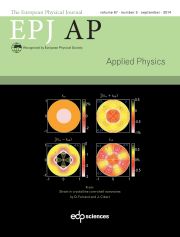Article contents
TLM extension for the study of screen printing contacts on multicrystalline silicon
Published online by Cambridge University Press: 15 April 1998
Abstract
The solar cell metallic contacts are decisive elements to get high and stable photovoltaic performance. On the other hand, the necessary cost reduction leads to the replacement of monocrystalline semiconductor by a multicrystalline one, and the evaporated contact by the screen printing technique; this last has the advantage of being inexpensive and easy to use. In this work, we have developed a methodology to characterize the screen printed contacts on multicrystalline silicon solar cells. These contact parameters are given by the TLM (Transmission Line Model) technique. This study constitutes in extending this model for multicrystalline silicon by the use of an average method. It is experimentally and analytically compared to a standard average technique. In this paper, we show that TLM measurements can be adapted, with a good accuracy, to characterize the screen printed contacts on multicrystalline silicon solar cells; thirty six TLM patterns are sufficient to get this.
- Type
- Research Article
- Information
- Copyright
- © EDP Sciences, 1998
- 1
- Cited by




